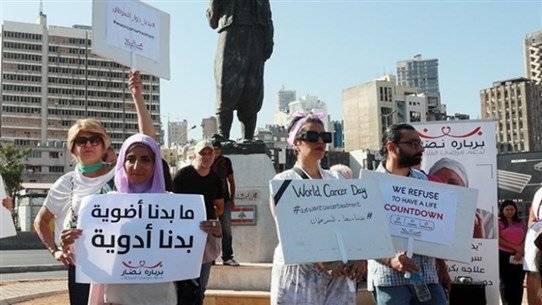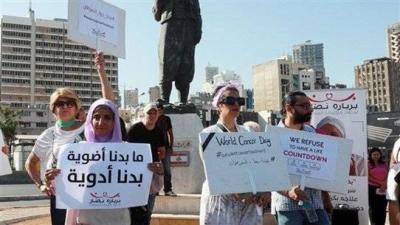The "Medi Track" medication tracking system could have been described as an achievement if it hadn’t emerged under the pressure of a crisis that rendered its existence surreal, considering it was designed to manage patient files amid an internet blackout. Mechanization without the internet. This is what is happening today at the drug distribution center in Karantina, where the system frequently fails due to internet outages, disrupting all operations in the center… and affecting the lives of patients.
Patients are no longer solely concerned about the loss of medication from the distribution center in Karantina; the "internet" has now become a partner in their worries. Those heading to the distribution center must now factor in the status of the internet before considering their medication, as the recurring outages hinder the functioning of the "Medi Track" system, which has become the sole operational unit there: from recording transactions, to distributing medication to centers in various regions, and finally delivering medication to patients.
From the very first moment the tracking system was launched at the center, bad luck has accompanied it. From experimental errors that plagued its start, to strikes by “Ogero” employees from time to time, to occasional internet outages. All these factors lead to a singular path: jeopardizing the lives of patients to a "system." A mechanization system without an internet connection.
Recently, the frequency of outages has increased, with one week experiencing three interruptions, most recently last week when operations ceased for two days. The biggest problem is that no one knows when the "news" of the internet will cut off, as outages usually occur without warning, and similarly, when it comes back online, no one knows when. In the meantime, the day passes sluggishly. No work, and at the same time, no ability to stop operations, while patients gather at the doors waiting for news that might release their medications, or at least to inquire whether they are available or not.
**Pen and Paper**
This is the situation on most days in Karantina, where centers disconnect from reality in an instant, with no solutions in sight as all operations are confined within the system. This means that "pen and paper" are no longer at hand today for managing patient files or requests from clinics or care centers, among others. Nevertheless, some resort to "bending reality and the law under exceptional circumstances," as one individual described, resorting to "working from home to process requests related to clinic orders and care centers and vaccine deliveries, sending a copy to the center for delivery, as sometimes someone comes from far regions based on an appointment and we are forced to do this."
On other occasions, workers may also resort to delivering some requests "on paper," if it is possible to process the order that way. However, the cost of this necessity lies in the increased effort, as "we are later obliged to re-enter this information into the system for mechanization." The complications do not stop there, especially since the margin for error may widen with leaving the system temporarily, and sometimes leads to a "risk," according to one worker. Besides being "against the law," the danger lies in handing over medications on paper, which could lead to errors, for example, if a different medication is delivered than the one indicated.
That said, while these risky options may apply to medication requests for clinics and centers and vaccine deliveries, they cannot apply to cancer medications that are strictly tied to the tracking system, especially considering that there are periodic new transactions that require approval from the Ministry of Public Health, necessitating constant internet connectivity. Thus, there are no feasible alternatives for cancer patients; in the absence of the network, medication is withheld from them even if it exists. This concern also applies to other patients with chronic and critical illnesses. Workers there criticize this connection, stating it withholds medication from most patients specifically "due to new transactions," proposing the option to work "offline" with older files but not the new ones. While this would subsequently involve additional work to re-enter the information later, they argue "we cannot link all patients to a few new files."
**Cancer Medications: A Sustained Crisis**
The queues of patients at the distribution center do not lessen, and the faces usually do not change, as many patients come daily to inquire about their medications and whether they are available. Often, they do not find everything they need. The situation at the Karantina door is "like the lottery… if not the second delivery then it will be on Thursday," says one person waiting in the long line.
The crisis in Karantina is ongoing, as available medications do not meet required needs, and there is uncertainty over when what is lost will return. This refrain has become obvious to the workers there. And while the reasons hindering the availability of medications altogether are well-known—stemming from drug import companies to support lists and central bank funds—it is still "not an excuse to leave it this way," say some workers without having the slightest answer for potential solutions.
Due to this situation, workers are forced to "make do with what is available," which is often unfair, as the division of medication requires transferring 50% of the drugs to the Karantina distribution center and another 50% to the regional centers. Sometimes, this can result in several regional centers receiving no medication from the amount that arrives. One worker gives an example regarding a cancer medication, Zelboraf, stating that 10 boxes arrived, "5 of which went to the Karantina center, while we must divide the remaining boxes among nine centers!"
**Donations and Expiration Dates**
Today, the center relies on donations, with one civil society organization providing the available medications, "and we choose from the list what we need, but we do not take all the quantities because we track expiration dates." This is one of the challenges with donations since the quantity is often conditional on expiration dates that are usually imminent. Additionally, there is another struggle in dealing with civil society organizations, as "some organizations try to impose limits on us; we previously faced this concerning vaccines when one association tried to dictate whom we should give to and whom we should withhold from, and we refused this notion."
Thus, the collapse and absence of state support has left them at the mercy of donations from organizations, which have become routine, yielding more from donations than what they seem to be acquiring through purchases, which appear to be virtually halted.
The crisis does not only affect cancer medications; there are also other critical illnesses whose patients are losing access to their medications, including those for diseases "that should not lose their treatment from the center." An example of this is a medication used by patients undergoing organ transplants. Even though this medication is "mandatorily required," it has been absent in Karantina for two months.




